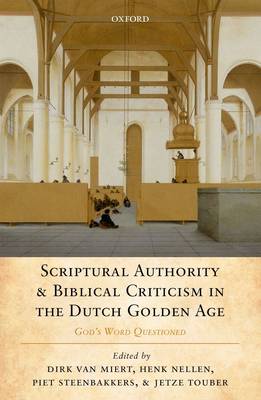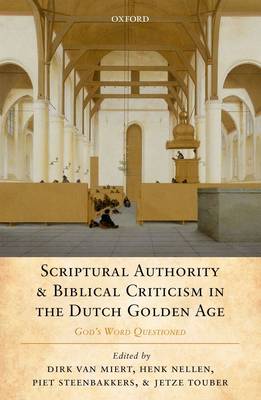
- Afhalen na 1 uur in een winkel met voorraad
- Gratis thuislevering in België vanaf € 30
- Ruim aanbod met 7 miljoen producten
- Afhalen na 1 uur in een winkel met voorraad
- Gratis thuislevering in België vanaf € 30
- Ruim aanbod met 7 miljoen producten
Zoeken
€ 257,95
+ 515 punten
Omschrijving
Scriptural Authority and Biblical Criticism in the Dutch Golden Age explores the hypothesis that in the long seventeenth century humanist-inspired biblical criticism contributed significantly to the decline of ecclesiastical truth claims. Historiography pictures this era as one in which the dominant position of religion and church began to show signs of erosion under the influence of vehement debates on the sacrosanct status of the Bible. Until quite recently, this gradual but decisive shift has been attributed to the rise of the sciences, in particular astronomy and physics. This authoritative volume looks at biblical criticism as an innovative force and as the outcome of developments in philology that had started much earlier than scientific experimentalism or the New Philosophy. Scholars began to situate the Bible in its historical context. The contributors show that even in the hands of pious, orthodox scholars philological research not only failed to solve all the textual problems that had surfaced, but even brought to light countless new incongruities. This supplied those who sought to play down the authority of the Bible with ammunition. The conviction that God's Word had been preserved as a pure and sacred source gave way to an awareness of a complicated transmission in a plurality of divergent, ambiguous, historically determined, and heavily corrupted texts. This shift took place primarily in the Dutch Protestant world of the seventeenth century.
Specificaties
Betrokkenen
- Auteur(s):
- Uitgeverij:
Inhoud
- Aantal bladzijden:
- 466
- Taal:
- Engels
Eigenschappen
- Productcode (EAN):
- 9780198806837
- Verschijningsdatum:
- 5/12/2017
- Uitvoering:
- Hardcover
- Formaat:
- Genaaid
- Afmetingen:
- 152 mm x 236 mm
- Gewicht:
- 879 g

Alleen bij Standaard Boekhandel
+ 515 punten op je klantenkaart van Standaard Boekhandel
Beoordelingen
We publiceren alleen reviews die voldoen aan de voorwaarden voor reviews. Bekijk onze voorwaarden voor reviews.











